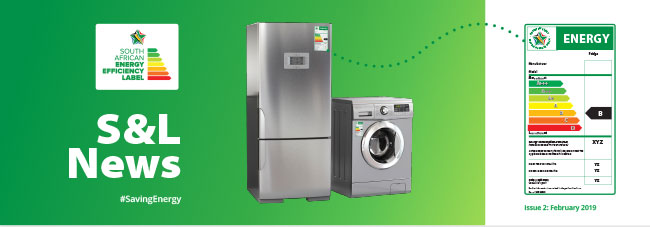Newsletter Issue 3 March 2019

Project Manager’s Message
Our reporting goes global in this third edition of the S&L News, as the project team finds itself in Paris, San Francisco and Washington – while on the local front, our national energy efficient appliance winners celebrate their good fortune and we cast light on draft regulation for general lighting.
Having hit the ground running this year, the project literally got flying in Feb, as the project team embarked on a dynamic foreign journey to further cement its international partnerships – bringing back global insight, support and expertise to the S&L project.
Twinning of National Ozone Officers and Energy Policymakers for Energy Efficient and Climate-Friendly Cooling Workshop – Paris
This workshop attended by over 140 countries, was held from 21-22 February and included Ozone Officers and national energy policymakers from all regions of the continent – jointly organized by UNEP’s OzonAction Compliance Assistance Programme (CAP) and the United for Efficiency Initiative, with the support of K-CEP (Kigali Cooling Efficiency Program). It is part of a two year initiative for 2018 & 2019, and provided an opportunity for National Ozone Officers and national energy policymakers to interact and share insights and experiences through a participatory format – exploring national and regional energy efficiency opportunities identified by participants. The team also found time to catch up with the International Energy Agency and International Partnership for Energy Efficiency Cooperation.
Energy Efficiency Modeling and Policy Impacts Training Workshop – Berkeley University – San Francisco
The project team, with support from USAID, also visited the Berkeley National Laboratory a longstanding partner of the S&L programme, to undergo 5-day intensive energy modelling training. The learnings of the workshop will allow data collected from the new registration database and other sources to be used to inform future policy decisions for the residential sector – from energy usage, to appliance penetration rates, and resultant electricity savings from the project. More specifically, the training will assist the project team to improve implementation, based on the use of empirical data and sound modelling methodologies.
CLASP and USAID – Washington DC
Maphuti Legodi Project Manager Energy Efficiency Initiatives, DoE and I are also visiting CLASP, a global NGO focused on accelerating energy efficiency around the world https://clasp.ngo/. CLASP has been highly supportive of the project over the years – and continues to do so for the lighting MEPS we are developing (see piece on lighting below). We also took the opportunity while in DC to visit USAID, who have in recent months provided technical support to the project.
Thank you to all our hosts, it’s been a tremendous journey; so look out for feedback on all our interactions in coming editions! For now, I’m pleased to announce that we’ll be hosting workshops in early April, focused on the next set of appliances being considered for MEPS, and invitations will be sent out shortly.
I hope to see you all very soon, and thank you all for your ongoing participation!
Theo Covary
Winners Winners Winners
They hail from numerous provinces around the country and from both major metropoles and small towns; but one thing unites them – the joy of winning top class energy efficient appliances for participating in our online survey! As you can see from the photos this was an occasion worth celebrating, and it caused a splash on social media too! More such initiatives to follow soon!



Lighting Up Efficiently
Draft regulation for general lighting was prepared by NERSA, and stakeholder consultation began via a first engagement with industry members on 5 December 2018. Here, it’s also important to note that the draft regulations have taken a technology-neutral position for the following reasons: to (i) respond to the evolving technology environment, (ii) include rapidly advancing LED lighting technology, (iii) better align with more stringent performance and efficiency regulations of the international market and (iv) recognise the fact that South Africa is signatory of the Minimata Convention on Mercury.
Industry members were therefore invited to complete risk assessments for all the technology covered by the draft regulation – submitted by 21 January 2019. Various written submissions other than the risk assessments were also received and are all currently under review, so as to guide the next consultation session. So keep an eye out for future feedback in coming editions!
Till then, may your March be as energy efficient as possible
